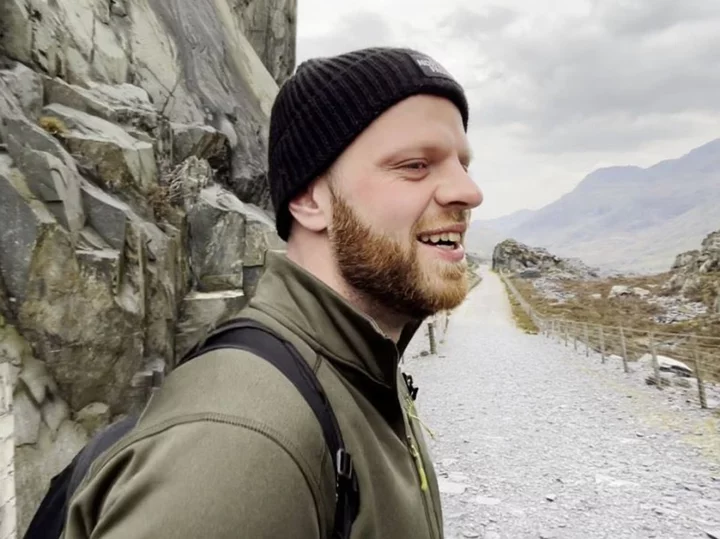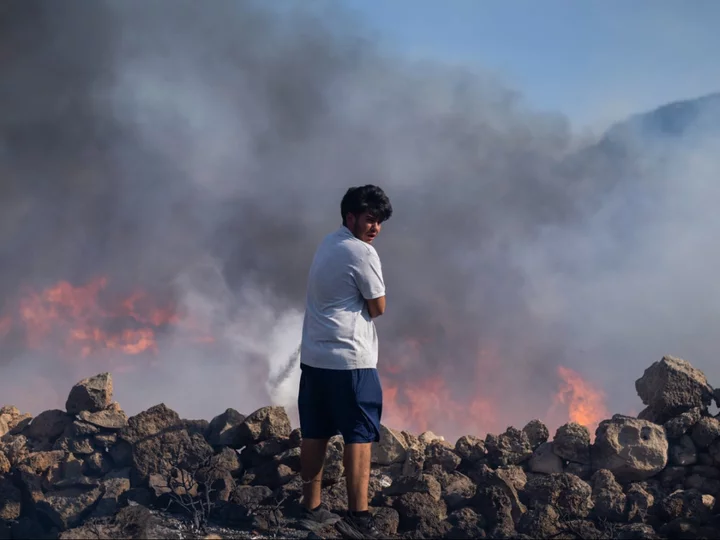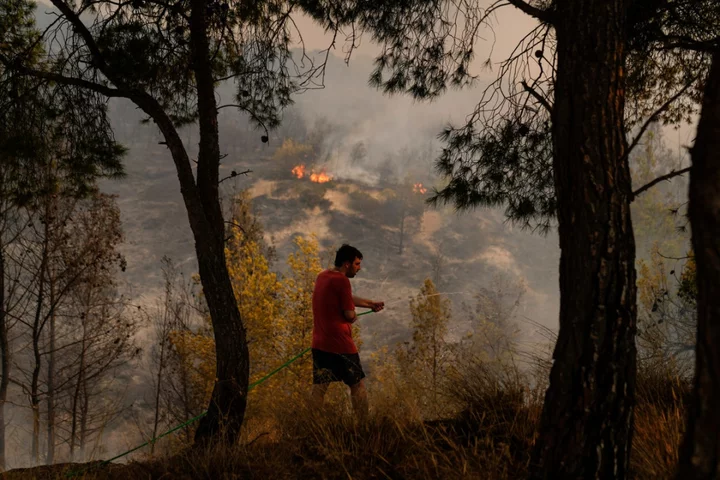
Calls for extra bank holiday if Lionesses win Women’s World Cup
England has made it through to the first World Cup final since 1966 after the women's football team defeated Australia today - and calls are now mounting for a bank holiday if the Lionesses take home the trophy this weekend. Labour and the Liberal Democrats, as well as Lionesses’ manager Sarina Wiegman, have all backed the idea of an additional day off if England beat Spain in the World Cup final on Sunday. But the government has poured cold water on the prospect, saying an extra bank holiday is not currently in its plans. Downing Street said it will find the “right way to celebrate” if the Lionesses are triumphant. Prime minister Rishi Sunak congratulated the team on beating Australia earlier on Wednesday, posting on social media: “What a performance @Lionesses. Just one more game to go... Bring on Sunday.” Sir Keir wrote: “It’s almost 60 years since England won the World Cup. I’m never complacent about anything… but there should be a celebratory bank holiday if the Lionesses bring it home.” Goals from Ella Toone, Lauren Hemp and Alessia Russo gave England a 3-1 win on Wednesday. The UK had two extra bank holidays last year – one for the Queen’s Platinum Jubilee and another for her funeral – and there was a third in May this year for King Charles’s coronation. Lib Dem leader Sir Ed Davey said: “The Lionesses have made history by reaching the final – they are an inspiration to athletes across the country already. “Winning the World Cup would be a phenomenal achievement. It absolutely deserves to be celebrated with a bank holiday.” TUC general secretary Paul Nowak said if the Lionesses won, the government should “do the right thing”, adding: “It would be mean-spirited not to do so.” Bend It Like Beckham director Gurinder Chadha told Channel 4 News that if the men’s team won the World Cup, there would be a holiday, adding: “So it deserves some kind of marking, it deserves some kind of national holiday definitely or something.” A petition on the parliament website asking for a bank holiday states: “I’d like the government to declare a bank holiday for all workers in the United Kingdom. Then we can celebrate in the achievements of England’s football team.” However, polls on social media showed nearly 60 per cent of voters were opposed to a bank holiday marking a win. Some users said England could not afford another bank holiday with the economy struggling. Others accused Sir Keir of populism, and one small business owner said they had had “more and enough bank holidays to put up with this year”. One, called Damon, posted: “If we can have a bank holiday for some old bloke getting a crown put on his head, I think it’s perfectly reasonable to have one if England win the World Cup.” A government spokesperson said: “Winning the World Cup would be a massive moment for the country and make no mistake we’ll find the right way to celebrate. “As Sarina Wiegman herself has said, the first thing to do is focus on the final and the whole country will be rooting for the Lionesses this weekend.” Earlier, No 10 told the BBC: “The current pattern of public and bank holidays is well established and there are no plans to change this.” A 2010 Commons library report said the then government estimated an additional bank holiday would cost the UK economy £2.9bn. Official figures released last month showed it contracted in May after businesses downed tools for the coronation. Gross domestic product fell by 0.1 per cent for the month, after increasing by 0.2 per cent in April, the Office for National Statistics said. Read More With one sublime pass, the Lionesses have unlocked the door to football Narnia Royals lead cheers for Lionesses as they reach first World Cup final Lionesses celebrate reaching World Cup final – Wednesday’s sporting social Mediterranean lifestyle cuts chances of premature death, study suggests Calls for a bank holiday if Lionesses win World Cup final Number of hospital appointments cancelled due to strikes nears one million
1970-01-01 08:00

Man dies after suffering serious injuries at new Everton stadium construction site
A man has died after being injured at the construction site where Everton FC are building their new stadium. The 26 year-old victim, a worker on the development, was involved in an “incident” at the Bramley Moore Dock site in Liverpool at around lunchtime. A Merseyside Police spokesperson said: “We can confirm that a man has died after an incident at Bramley Moore Dock this afternoon. At around 1pm it was reported that a man, aged 26, had been injured. “He was taken to hospital where he was pronounced dead. His next of kin have been told and an investigation is under way.” A spokesperson for the club said they were ‘heartbroken’ by the unnamed individual’s death. Everton FC said: “Everyone at Everton Football Club is heartbroken by the news a male worker has died following an incident at the Everton Stadium site at Bramley-Moore Dock. “The thoughts and condolences of everyone connected with Everton are with his family, friends, and colleagues at this unimaginably sad time. “Stadium contractor Laing O’Rourke has immediately launched an investigation and will work with the police and the Health and Safety Executive to establish the full details of the incident.” Work began on the new stadium two years ago, as part of a £500 million waterside scheme in the city. A spokesperson for contractors Laing O’Rourke said: “We can confirm that earlier today a member of our team, who was carrying out work for one of our sub-contractors, was seriously injured in an incident. He was taken to hospital via ambulance, where he sadly died. “We are shocked and saddened by today’s tragic incident and our thoughts are with the family and friends of the deceased man and our wider project team. “The police and the Health and Safety Executive are on site and we have suspended work until further notice. We will cooperate fully with any investigation that follows.” Read More Cook says Australian mushroom deaths were ‘accidental’: ‘I had no reason to hurt people I love’ Couple whose husky mauled their baby daughter to death allowed to keep pack of dogs Heartbreaking moment Hawaiian broadcaster reveals on air he lost four family members to Maui wildfires RAF jets launched to intercept Russian bombers off coast of UK Bibby Stockholm: A timeline of the government’s controversial migrant accommodation Public support for new Brexit referendum revealed
1970-01-01 08:00

Aidan Roche missing: All we know about British hiker who vanished in the Swiss Alps
A British hiker has been missing in the Swiss Alps for more than a month, as his family continue the search to find him. Aidan Roche, 29, travelled to Switzerland for a two-week solo holiday in June, where he planned to track a mountain trail in the Grindelwald area. He was last heard from on 22 June, twelve days into his two-week trip and there has been no trace of him since. His brother Connor said of the experienced hiker: “It’s not something he wouldn’t have been able to manage. But sometimes you know, all it takes is a freak occurrence for something to go wrong.” His family and friends have set up GoFundMe page to help support further search efforts, as they say the Swiss police and mountain rescue service have ceased their efforts having “exhausted every option”. The campaign has now exceeded its £30,000 goal, with funds going towards generating new leads by raising awareness in the area, as well as the use of a search helicopter. Below we look at everything we know about search so far. Who is Aidan Roche? Aidan Roche is an experienced hiker from Middlesbrough. The 6ft 2in tall 29 year-old works as an offshore chemical engineer. He grew up in Longlands, a central Middlesbrough neighbourhood, and was living in Leeds at the time he went missing. He had planned to move back to Middlesbrough after his trip. “He’s a character and this solo travel thing is exactly the type of thing he loves,” his brother Connor has said. “He can talk to absolutely everyone and he can just make friends with anyone.” Aidan’s friend Beth Taylor says he had a distinctive tattoo on his arm reading “MAYASWELLMAYSENYA” and loved to play “blaring” music from a speaker as he walked. Where was he last seen? A video taken at 11:36am BST places Roche a short distance away from the village of Grindelwald, which sits at the foot of the Eiger mountain. Friends say this is the last footage he sent to them. In this video, and two others sent on the same day, other hikers can be seen in the background.Ms Taylor posted an appeal on TikTok, asking anyone with information about these people to come forward – it has been viewed 26,000 times. She says his family are looking for a woman seen sitting on a rock in a video filmed at 11:05 BST and five people near a waterfall filmed in the final video. “I know he would have spoken to the girl sitting near him in the video, and the people walking towards him. We’re just hoping that someone can identify them and give us a new lead.” The family have also released Aidan’s last text messages before he went missing, sent to an unnamed friend, where the 29-year-old wrote: “Hello, hello. I should be in Grindelwald in about two hours,” followed by a picture of the view from the trail, and his final message: “I’m still pretty high. I’ll see you back at camp.” What is the latest on the search? Mr Roche’s family went to Switzerland on 21 July to try and find him themselves. They have been forced to continue the search alone after the Swiss police and mountain rescue teams ended their efforts after ‘exhausting every option. This is proving costly, so the family and friends have launched a GoFundMe appeal so they can keep going. His brother Connor Roche provided an update on 30 July: “We just need some more information. We’ve had nothing coming in from any of the missing posters. “We’ve also now been given the bill for the search helicopter, which came to £7k.” His other brother Niall explained how the search effort went: There’s none of his bag or anything that he had with him. It doesn’t make sense how we haven’t found anything. From the timestamp of the picture he sent, it’s about 90 minutes of hiking and it’s not particularly difficult.” What have his friends and family said? In her TikTok video, Mr Taylor said Mr Roche had “biggest heart” and would “do anything for anyone”. Speaking to the Guardian, Connor Roche said: “I try and keep up hope that maybe he’s decided to wander off, or he’s hit his head and forgotten who he is, but I have to drag myself back to what we actually know and the evidence suggests that he’s still on the mountain and we haven’t found him yet. There’s the outside chance that he has some crazy survival story.” “You can’t help but imagine the worst of things sometimes – especially with it being this long since he went missing. “But then you feel guilty for imagining those things. Right now we just need more information – anything that can help us find him and bring him home.” Read More Brother’s desperate plea to find British hiker, 29, who vanished in Swiss Alps British Scouts attending South Korea jamboree moved to hotels after illness outbreak ‘Love, obsession, extortion and murder’: The dramatic downfall of TikTok influencer who became a killer Chef Tafari Campbell’s death ‘not suspicious’ as Obama daughters leave island Boris Johnson vows to protect newts threatening plans for pool at his country manor British Scouts pulled from South Korea jamboree as hundreds struck down by heatwave
1970-01-01 08:00

As Twitter becomes X - Seven disastrous rebrands from Royal Mail to New Coke
Billionaire Elon Musk rebranded Twitter this week and replaced the iconic blue bird logo with a black X, in his latest effort to overhaul the social media giant. The redesign ties in with Musk’s plans to build an “everything” platform –like China’s WeChat or PayTm in India – as he encouraged users to reimagine the “whole concept” of the app formerly known as Twitter. On 24 July, the Tesla founder tweeted a picture of the new logo cast on the Twitter headquarters building in San Francisco, as workers were seen taking down the bird logo that has defined the platform since it was launched in 2006. Musk also redirected the website x.com to twitter.com, and announced that Twitter will soon only be available in dark mode. But it wasn’t an entirely smooth rollout, as it was later revealed Twitter had failed to secure the required permits to change the building signage. Trademark experts also warned Musk could face legal action over his use of X, since rivals Meta and Microsoft both own intellectual property (IP) rights for the letter. The site was reportedly blocked in Indonesia after Mr Musk unveiled the X logo because of the country’s laws on online pornography and gambling. User reactions were also mixed. “The X logo looks like it’s for one of those ridiculous fragile masculinity subscription box services that would send you like an axe, a bottle of hot sauce, small batch coffee, and some beard oil every month in 2019,” one tweet – or is it an X – read. As Twitter moves into a new era, on the heels of a controversial revamp, we look back on seven marketing fails: Royal Mail to Consignia In 2001 the Royal Mail was rebranded as Consignia, but it did not last long. “The new name describes the full scope of what the Post Office does in a way that the words ‘post’ and ‘office’ cannot,” Royal Mail’s then-chief John Roberts unveiled the results of a £2m rebrand, adding that the “modern, meaningful and entirely appropriate” name was suited to the company’s aspirations of becoming an international postal operator. The public did not agree and just 16 months later Consignia was renamed Royal Mail plc, reversing what is considered one of the most disastrous corporate rebranding efforts in recent history. The strategist who led the Consignia rebrand later defended it in an interview with the BBC, explaining why the name was chosen. Keith Wells, who was the director of Dragon Brands, said: “It’s got consign in it. It’s got a link with insignia, so there is this kind of royalty-ish thing in the back of one’s mind. And there’s this lovely dictionary definition of consign which is ‘to entrust to the care of’. That goes right back to sustaining trust, which was very important.” Coke to New Coke “New Coke” remains the benchmark for bad product launches, nearly 40 years after the Coca-Cola company infamously decided to change its secret recipe to gain a competitive advantage over then-up-and-coming Pepsi Co during the cola wars of the Eighties. The decision backfired, as passionate Coke drinkers were devastated by the new taste of the beverage – even launching grassroots campaigns across the United States to bring back the old Coke. “It was the people against the corporation – only in America,” CBS News reporter Bob Simon said in 1985. “Coke said it was committed, so were the people. In California they collected signatures, in Seattle they set up a hotline.” Delighted by their rival’s blunder, Pepsi released an advertisement featuring a girl who asked: “Somebody out there tell me why Coke did it? Why did Coke change?” Coca-Cola eventually buckled under the pressure and announced it would bring back the original taste of Coke, with the company’s then-president saying: “The simple fact is that all of the time and money and skill poured into consumer research on a new Coca-Cola could not measure or reveal the depth and abiding emotional attachment to original Coca-Cola felt by so many people.” Facebook to Meta Mark Zuckerberg’s Facebook became Meta in October 2021 to signal its future as a “metaverse company”. A metaverse is defined as “a digital reality that combines aspects of social media, online gaming, augmented reality (AR), virtual reality (VR), and cryptocurrencies to allow users to interact virtually.” While the tech billionaire insisted the rebrand had nothing to do with the PR crisis during what is now remembered as Meta’s worst year ever. From claims the US Capitol riots were organised on the social media platform to employee-turned-whistleblower Frances Haugen’s allegations, Facebook’s reputation took a severe beating in 2021. And the new name didn’t help. According to a report from The Harris Poll, public trust in Zuckerberg’s company significantly dropped after the announcement that it was going to be known as Meta. PR experts also told Insider Meta would have to do “fundamental work” to win back this trust. PwC to Monday One of the Big Four accounting firms, PricewaterhouseCoopers confusingly changed the name of its consulting arm to Monday in what is widely considered a big branding blunder. “Monday is a new identity on which to build our company’s future, and it will have meaning and stand for something,” the company’s then-CEO Greg Brenneman said, announcing the new name that, apparently, conjures images of “fresh thinking, doughnuts, hot coffee”. However, the brand name was a flop as it failed to capture the essence of PwC’s work, and caused widespread confusion – and derision – from members of the public as well as the press. “The day of the week formerly known as Monday would like to announce its name change to distance itself from PWC Consulting. Forthwith it will be known as Tuesday Eve,” one person quipped. Reporting on PwC’s new name, CNN Money said a spokesperson from Wolff Olins, the agency that led the $110m rebrand, “could not immediately be reached Monday—the day, that is.” The rebrand was eventually rolled back. Hershey’s new logo The well-known chocolate company in 2014 unveiled a logo that resembled a “steaming pile of s***” as the abandoned design continues to amuse TikTok users nine years later. When Hershey’s set about trying to create a fresh and modern interpretation of its beloved Kisses icon, it replaced a photograph of their silver Hershey’s Kiss with an animated, brown version and a gray curlicue to represent its packaging. “The new branding will impact all visual aspects of how The Hershey Company presents itself,” the company said in a statement at the time, “from consumer communications to websites to the interior design of its office spaces and the look of its retail stores.” Amused customers were quick to point out the logo had ended up looking like a poop emoji instead, an unsavoury association to make with a chocolate brand. @zacharywinterton Once you see it you cant unsee it. This design is proof that not all logos are created equal ? #logodesign #designfail ♬ original sound - Zachary Winterton Sunny Delight The orange soft beverage launched in the UK in 1998 was once considered a threat to Pepsi and Coke. However, a poorly-timed advertisement amid regulatory scrutiny brought grey storms for Sunny Delight, as the drinks sales fell from a record high of £160m to a measly £6.8m by 2010. The Food Commission launched a campaign against Sunny Delight, claiming it was bad for children after it was reported that one child in Wales turned yellow from drinking 1.5 litres of the drink. “This is excessive consumption and consumption on that scale would lead to a yellowing of the skin because of the beta carotene, in the same way as drinking too much carrot juice or orange juice would,” a spokeswoman for the company said at the time. The girl’s condition, caused by betacarotene which gives the drink it’s colour, emerged at the same time as Sunny Delight was running an ad campaign featuring a pair of snowmen turning orange. Consequently, the popularity of Sunny Delight reportedly halved, as consumers lost their appetite for the bright yellow, sweet drink. Cardiff City’s football kit In 2012, the club’s then-new owner gave the kit an ill-conceived makeover. He decided to put the team, nicknamed the Bluebirds, in a red kit and changed the logo from a blue bird to a red Welsh dragon. “The change of colour is a radical and some would say revolutionary move which will be met with unease and apprehension by a number of supporters, along with being seen as controversial by many,” ex-chief executive Alan Whiteley said. “To those I would like to say that this was not a decision that has been taken lightly or without a great deal of thought and debate. Fans retaliated and the blue kit was restored, with approval from the club’s owner Vincent Tan. Read More Sinead O’Connor latest: Singer moved to London ‘to feel less lonely’ after son’s death, neighbours say England vs Denmark LIVE: Women’s World Cup result and reaction as Lionesses win but Walsh injured Man in debt after driving motorhome through London’s low emission zone First British passports issued in King’s name unveiled Royal Mail wins contract for collection and delivery of passports Mapped: Ten worst UK hotspots for dog attacks on postal workers
1970-01-01 08:00

UK rescue flights for tourists fleeing ‘out of control’ wildfires in Rhodes and Corfu
UK airlines are scrambling evacuation flights to the wildfire-ravage islands of Rhodes and Corfu where up to 10,000 British tourists are stranded in a “living nightmare” as a fresh red alert is issued for Crete. The two biggest holiday firms Tui and Jet2 have axed all flights to the island in the coming days after holidaymakers forced to flee their hotels had to sleep on floors in schools, airports and sports centres – but other firms, including Ryanair, Thomas Cook and easyJet continue to fly tourists who want to travel to Rhodes. The popular destination of Crete was also placed under an “extreme” fire warning on Monday, with Greek PM Kyriakos Mitsotakis telling parliament it must “be on constant alert” in the weeks ahead. He declared his country to be “at war” with the blazes and warned of three more “difficult days” before the extreme heat eases. “The climate crisis is already here, it will manifest itself everywhere in the Mediterranean with greater disasters,” Mr Mitsotakis said, just a week after multiple infernos ignited near Athens, destroying homes and businesses, and days after temperatures hit 45C. Prime minister Rishi Sunak urged holidaymakers to remain in touch with tour operators but the Foreign Office has so far not discouraged Britons from travelling to Greece. Urging the UK government to “get a grip”, Lib Dem MP Layla Moran hit out Tory ministers’ “inaction” as she warned current advice was leaving families unable to claim on their insurance to “[pay] the penalty for deciding not to fly out” to Rhodes. More than 2,000 holidaymakers have so far been repatriated in what was described as the largest evacuation in Greek history, with more flights due on Tuesday as Rhodes’ deputy mayor warned the fires remained “out of control” seven days after flaring into life. Helen Tonks, a mother-of-six from Cheshire, accused travel firm Tui of flying her into “living nightmare” on Saturday night, as she told The Sun of landing in Rhodes only to be informed that her hotel had already burned down. The firm has now cancelled all flights to the island until Saturday. Claire Jones, a 36-year-old from Leicestershire on a honeymoon with her new husband Paul was evacuated by coach over the weekend in a “traumatic” journey as fled their hotels on foot carrying babies and small children, with some reporting walking for 10 miles in searing heat. Upgrading the fire risk in Crete to the highest warning level on Monday, Greek authorities also put swathes of the country under notice of a “very high fire risk”, including Athens, the Peloponnese, Karpathos, Kalymnos and Kos. While authorities have suggested the Corfu blazes may be a result of arson, the UK’s former chief scientific advisor Sir David King warned on Monday that the millions of British tourists planning Mediterranean holidays this summer should take Greece as “a big, big warning”. Lamenting that “many people will die from heat stress” due to the relentless heatwaves scorching southern Europe, Sir David said he had “no doubt” that the extreme temperatures are due to melting ice in the Arctic caused by human-led climate breakdown. Temperatures in Rhodes were forecast to climb as high as 40C by Wednesday, as Greece faces its longest heatwave on record. The EU’s civil protection agency has deployed some 450 firefighters and seven planes from Bulgari, Croatia, Cyprus, France, Italy, Malta, Poland, Romania, and Slovakia. But the travel industry appeared to be preparing the ground for a restart in tourism in some of the unaffected areas. A spokesperson for Abta, the travel association, said: “We understand that some of the resorts have had their evacuation order removed by the Greek authorities and people have been advised that they can return to the resorts of Lindos, Pefkos and Kalathos. “Travel companies will be liaising with their accommodation providers to ensure that they are ready to receive customers and customers will be notified accordingly.” Chris Elworthy, a 42-year-old farmer from Faversham in Kent, said he had been left £10,000 out of pocket after his easyJet flights to reach a private villa in Pefkos with his wife and two children were cancelled. “We are now £10,000 out of pocket; easyJet is not helping at all with a flight, despite having promised on Twitter that they would provide a voucher or another flight ... 24 hours later they have done nothing,” he said. “The villa is refusing to refund us, and the holiday insurance is saying that we’re not covered because we didn’t have the additional natural disaster cover on top of the ordinary cover.” Dan Jones, a sports teacher from Torquay, had to climb onto a fishing trawler with his sons to escape the raging fires on Saturday night, describing it as “the scariest moment” in his life and adding: “What brave boys.” Estimating that between 7,000 and 10,000 British tourists were on Rhodes due to it being peak holiday season, Foreign Office minister Andrew Mitchell told LBC that reports of holiday company reps seeming “to have gone missing” was “a deplorable state of affairs” which the government would investigate. But he defended the lack of advice against travelling to Rhodes, saying the fact “that only 10 per cent of the island is affected by these fires” meant tour operators were “best placed to give guidance on whether or not a family or individual’s holidays are going to be ruined by these events”. Downing Street defended not discouraging people from travelling to Rhodes, despite sending a team to help holidaymakers affected by the fires. The PM’s official spokesman said: “The current situation is impacting on a limited area in Rhodes and whilst it’s right to keep it under review and it’s possible that the advice may change we do not want to act out of proportion to the situation on the ground.” There are “not currently” plans to get the RAF to help people leave, he added. Read More Wildfires: Is it safe to travel to Greece right now? Family £10,000 out of pocket after Rhodes holiday ruined by wildfires How long will the wildfires last in Greece? ‘Trauma’ for couple on honeymoon who fled Rhodes fires amid screams and smoke
1970-01-01 08:00

Russians against Ukraine war should spy for the UK, MI6 boss says
The head of MI6 has urged Russians appalled by the war in Ukraine to “join hands” with his spy service and bring the bloodshed to an end. In his second speech since becoming chief of the Secret Intelligence Service in 2020, Richard Moore said there appeared little prospect of Vladimir Putin’s forces regaining momentum in Ukraine – whose long-awaited counteroffensive is now under way. Delivering his speech at the British embassy in Prague, the MI6 chief likened the current situation in Ukraine to the Prague Spring in 1968, when the Soviet Union quashed liberalising reforms. “As they witness the venality, infighting and callous incompetence of their leaders – the human factor as its worst – many Russians are wrestling with the same dilemmas as their predecessors did in 1968,” Moore said. “I invite them to do what others have done this past 18 months and join hands with us. Our door is always open ... Their secrets will be safe with us and together we will work to bring the bloodshed to an end.” While Mr Putin has sought to maintain an iron grip on the war narrative since Russia’s full-scale invasion last February, with the aid of state TV, public opinion of the conflict is likely to have been knocked by Moscow’s apparent military setbacks and his mobilisation of reservists last Septmeber. Many fighting age men have fled abroad to escape the draft, while thousands of protesters have been arrested in infrequent demonstrations across scores of Russian cities since the war began. “There are many Russians today who are silently appalled by the sight of their armed forces pulverising Ukrainian cities, expelling innocent families from their homes and kidnapping thousands of children,” said Mr Moore. “They are watching in horror as their soldiers ravage a kindred country. They know in their hearts that Putin’s case for attacking a fellow Slavic nation is fraudulent, a miasma of lies and fantasy.” More follows... Read More The Body in the Woods | An Independent TV Original Documentary The harrowing discovery at centre of The Independent’s new documentary
1970-01-01 08:00

Brits travelling to Greece given updated travel advice during extreme heat
Britons travelling to Greece have been told to sign up for emergency alerts as the country is gripped by “extreme heat” and wildfires. The UK Foreign Office has updated its travel advice for the popular tourist destination, with Britons warned of travel disruption as temperatures soar. It comes after thousands were evacuated from at least six seaside communities near Athens after their homes were threatened by wildfires. Much of Greece has been baking in near 40C conditions as a heatwave grips the continent, with temperatures in the southeast European country forecast to climb further later this week and into the weekend. “Extreme temperatures are currently affecting many areas of Greece,” the guidance says. “You can register on the Greek government’s Emergency Communication Service to receive emergency alerts.” Travellers are also advised to monitor local and international weather updates from the Greek Meteorological Service or European Meteorological Services, check conditions with their travel provider and follow the advice of local authorities at all times. There is also a chance that the extreme weather conditions could disrupt travel, the Foreign Office added. Officials in Greece issued the six evacuation orders on Monday morning as strong gusts of up to 70kph (45mph) whipped the wildfire closer to resort towns. The army, police special forces and volunteer rescuers freed retirees from their homes, rescued horses from a stable, and helped monks flee a monastery threatened by the flames. Last night water-dropping planes and helicopters tackled the flames near Lagonisi, some 40 km (25 miles) southeast of the capital. The second large wildfire broke out in a wooded area near the resort town of Loutraki, some 90km (55 miles) west of Athens, where a children’s summer camp and rehabilitation center for seniors were evacuated, local officials said. Fire Service spokesman Yiannis Artopios said the strong and changeable winds and mountainous terrain in which both fires broke out were slowing the firefighting effort. "The conditions are changing constantly and this has to be matched by our response. We have ordered multiple evacuations," he said. The evacuees gathered along the coastline or were put up in schools and hotels, while coast guard vessels were dispatched to smoke-heavy beachfronts to assist if needed. On a visit to Brusssels, Greek prime minister Kyriakos Mitsotakis described the risk posed by wildfires this month as "extremely difficult" to deal with. "We have always had wildfires and we always will have them. But with the effects of the climate crisis, we are experiencing fires with increasing intensity," Mr Mitsotakis said, speaking on the margins of talks between leaders from the European Union and Latin American and Carribean countries. Greater Athens and much of southern Greece were on the second highest level of alert for wildfires Monday and Tuesday following a four-day heat wave that eased over the weekend. More heatwave temperatures are expected later in the week. Residents and visitors in areas affected by the two fires received cell phone alerts from the Civil Protection Ministry. Loutraki Mayor Giorgos Gionis said municipal workers were also assisting seniors in the evacuations, adding that the operation had been impeded by cell phone reception outages. Local officials confirmed that homes had been destroyed and badly damaged in both fires. Southern and parts of eastern Europe are currently in the grip of a sweltering heatwave that meteorologists forecast will continue well into this week. Other popular holiday destinations including Italy, Spain and Turkey are also experiencing intense heat. Thousands of people were evacuated from their homes in the La Palma area of the Spanish Canary Islands over the weekend as a wildfire tore through 4,500 hectares of land as firefighters struggled to tackle the blaze. Forecasters in Italy say that Sardinia looks set to become the “epicentre” of the heatwave this week and could see temperatures of 48C (118.4F), just shy of the record 48.8C (119.8F) recorded in Sicily in August 2021. This week’s heatwave has been named Charon after the ferryman who delivered souls into the underworld in Greek mythology. Last week’s was named Cerberus - the name of a mythical creature in ancient Greek folklore. Cerberus, a three-headed dog, was believed to guard the gates to the underworld. Scientists say climate change is making extreme weather events like the current heatwaves in Europe more common. Read More Which holiday destinations will be hottest this week and how can you stay safe as temperatures soar? Europe heatwave: Is it safe to travel to Italy, Spain, Greece and Croatia? Extreme 40C heatwaves will frequently occur in UK without emissions cut, Met Office says Independent Traveller guide to best hotels and short breaks Best hotels in New York: Where to stay in Manhattan, Brooklyn and more Cheap hotels in Paris 2022: Where to stay for value for money
1970-01-01 08:00

Hungary fines book chain for selling British author’s LGBT+ novels
A legal battle appears set to erupt over the sale of a British author’s LGBT+- themed webcomic and graphic novel in Hungary, after Viktor Orban’s government attempted to ban a bookshop from selling it without closed packaging. The country’s second largest bookshop chain Lira has announced that it plans to take legal action after a Budapest government office fined it 12 million forints (£27,500), claiming it broke the law by selling Alice Oseman’s Heartstopper among other books for young adults without wrapping them in plastic foil. The sale of the Kent-born author’s book has fallen foul of a law passed by Mr Orban’s strongly Christian-conservative government banning the “display and promotion of homosexuality” to under-18s, a move viewed as resonating with rural voters ahead of his fourth-term election win in 2022. While the passage of the law in 2021 came despite strong criticism from human rights groups and the EU, the large fine now handed to Lira emerged on the same day that 38 countries, including Germany and the US, urged Budapest to protect the rights of LGBT+ people and scrap its discriminatory laws. Krisztian Nyary, a well-known author who works as creative director at Lira, told Reuters the fine was disproportionate, and criticised the law as vaguely worded as he indicated that the bookshop would respond legally. “As this is a resolution about a fine it cannot be appealed, it can only be attacked – in what way, our lawyers will assess,” he said. “We will use all legal means at our disposal.” Mr Nyary said that some publishers had already voluntarily wrapped their books in plastic coverings in an attempt to comply, but warned that it was not clear whether it was sufficient to place books affected by the law on a shelf for literature aimed for adults. He also said it was uncertain whether LGBT+-themed books meant for adults would also have to be wrapped up or if those could be sold without packaging, adding: “This is all not clear.” The law, which the government claims is aimed at protecting children, has caused anxiety in the LGBT+ community. It currently bans the display of LGBT+ content to minors in schools, literature, films, TV and adverts, while prohibiting the public display of products depicting gender reassignment. More than a dozen EU member states have backed legal action against the law – branded a “disgrace” by European Commission chief Ursula von der Leyen – in the European Court of Justice. In a statement reported by state news agency MTI this week, the Budapest metropolitan government office said an “investigation found that the books in question depicted homosexuality, but they were nevertheless placed in the category of children’s books and youth literature, and were not distributed in closed packaging”. While it is not the first time a Hungarian government office has fined a bookshop for violating the law, the fresh fine came ahead of a Pride march in Budapest on Saturday. Heartstopper has sold millions of copies and has been read more than 50 million times online, prompting streaming giant Netflix to release an adaptation of the ongoing series last April. Ms Oseman, a 28-year-old born in the Kent town of Chatham, who first secured a publishing deal aged 17, was handed two prizes at last year’s Children's and Family Emmy Awards and was nominated for a Bafta over the Netflix adaptation of Heartstopper, which also won Waterstones Book of the Year in 2022. Additional reporting by Reuters Read More Hungary's Orban bemoans liberal 'virus' at CPAC conference ‘Less drag queens, more Chuck Norris!’: Hungary’s Orban wows Republicans The Independent Pride List 2023: The LGBT+ people making change happen Netflix announces Heartstopper season 2 release date
1970-01-01 08:00

What is a Storm Shadow cruise missile?
British defence minister Ben Wallace announced that the top-tier, air launched Storm Shadow cruise missiles lent to Ukraine were striking targets with precision as the country continued to fight off Russia’s full-scale invasion clocking nearly 500 days. “The Storm Shadow missile has had a significant impact on the battlefield,” Mr Wallace said in a statement to the House of Commons on Monday this week, marking the first public acknowledgement of the missile’s use in the continuing war. "Its accuracy and ability to deliver successfully the payload, as sent and designed by the Ukrainians, has been almost without fault,” the defence minister said. “It has had an effect on the Russian army, mainly around its logistics and command and control. That shows the importance of deep fires,” he said. Ukraine’s counter-offensive is evidently in its early stages with the country’s forces repulsing attacks using several western weapon systems to boost its defence operations to stand up against Russia. In its arsenal of striking targets alongside top-tier rocket launcher systems sent from the West, including the HIMARS, are the British Storm Shadow cruise missiles. Manufacturer MBDA has said that the missile, which is fired from an aircraft, carries a range exceeding 155 miles and is designed to evade detection despite flying low after being launched. By contrast, the US-supplied Himars missiles currently used by Ukraine only have a range of around 50 miles. The longer range means Ukrainian pilots will be able to remain further from the front lines. But is still short of the 185-mile range of the US built Army Tactical Missile System, which Ukrainian president Volodymyr Zelensky’s staff had reportedly asked for. Powered by a turbo-jet engine, the 1,300kg Storm Shadow travels at speeds of more than 600mph, is just over five metres long and has a wingspan of three metres. After launch, the weapon, equipped with its own navigation system, descends to a low altitude to avoid detection before locking on to its target using an infra-red seeker. On final approach the missile climbs to a higher altitude to maximise the chances of hitting the target. On impact, it penetrates the target before a delayed fuse detonates the main warhead. Storm Shadow missiles have been used by British and French air forces in the Gulf, Iraq and Libya. In May this year, the UK confirmed it will supply Ukraine with the long-range Storm Shadow missiles it requested for its fight against invading Russian forces. Mr Wallace had touted that the weapons will give Ukraine the “best chance” of defending itself. Read More Ukraine has an array of new Western weapons. What advantages could they offer in a counteroffensive? Russia-Ukraine – live: Putin may take ‘formal control’ of Wagner in wake of attempted coup Tanks, missiles and keeping Russia guessing: The week Ukraine’s counteroffensive truly began What are Storm Shadow cruise missiles and what other weapons has the UK sent to Ukraine?
1970-01-01 08:00
